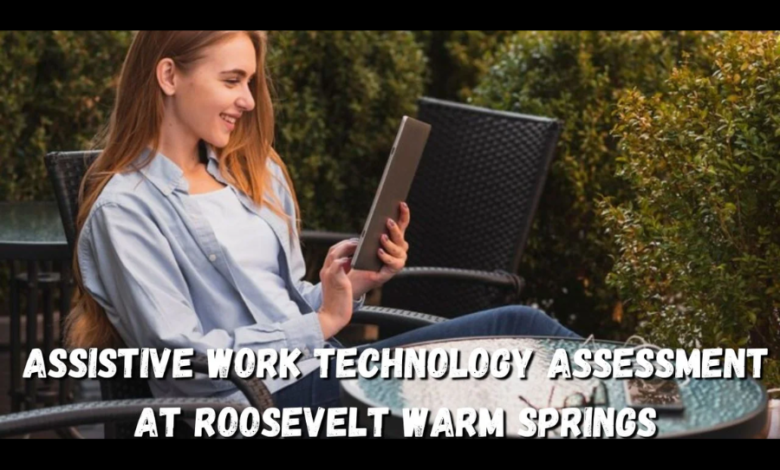Enhancing Employment Opportunities: An Overview of Assistive Work Technology Assessment at Roosevelt Warm Springs

Empowering Lives Through Assistive Work Technology at Roosevelt Warm Springs
Roosevelt Warm Springs (RWS), a historic rehabilitation center founded by President Franklin D. Roosevelt, continues to be a beacon of hope for individuals seeking comprehensive vocational rehabilitation. The facility excels in leveraging Assistive Work Technology Assessment at Roosevelt Warm Springs, ensuring that clients have the tools necessary to enhance their functionality in the workplace. At RWS, assessments focus on matching the right devices and solutions to each individual’s unique needs, facilitating effective and independent job performance.
Tailored Assessment for Individual Needs
Understanding that every individual has distinct needs, RWS offers a meticulous and personalized assessment process. A team of experts, including occupational and physical therapists, collaborates to evaluate clients’ capabilities alongside their job requirements. This thorough assessment encompasses physical abilities, cognitive functions, and sensory needs, ensuring a holistic approach that enhances the effectiveness of the Assistive Work Technology Assessment at Roosevelt Warm Springs provided.
Cutting-Edge Assistive Devices
Roosevelt Warm Springs employs a wide array of innovative assistive technologies that are continuously evolving. From voice-activated software to ergonomic workstations, RWS provides clients with state-of-the-art tools designed to boost productivity. Adaptive seating and specialized computer equipment are available for individuals with mobility challenges, while screen readers and magnification software serve those with visual impairments, empowering them to thrive in professional environments.
A Collaborative Multidisciplinary Approach
One of the standout features of RWS’s Assistive Work Technology Assessment at Roosevelt Warm Springs involvement of a multidisciplinary team. Experts from various fields work together to offer a comprehensive approach to each client’s needs. Physical therapists ensure that assistive devices support the client’s body mechanics, while occupational therapists focus on the practical application of technology in real-world work settings. Speech-language pathologists and audiologists assess communication tools for clients with speech and hearing challenges, guaranteeing that every aspect of the work environment is optimized for success.
Ergonomics at the Forefront
Ergonomics plays a crucial role in the assessment process at Roosevelt Warm Springs. An inadequately designed workstation can aggravate physical challenges, so RWS evaluates and customizes work environments to Assistive Work Technology Assessment at Roosevelt Warm Springs promote proper posture, reduce strain, and enhance comfort for individuals with disabilities. Examples of tailored solutions include adjustable desks, specialized chairs, and keyboard trays that meet each client’s specific needs.
Supporting Cognitive Function
Assistive technology at RWS also caters to individuals with cognitive impairments. Memory aids, organizational software, and adaptive learning programs are utilized to assist those with conditions such as traumatic brain injuries or learning disabilities, enabling them to perform effectively in diverse work settings.
Facilitating Communication
Effective communication is vital in any workplace, yet it can be a barrier for individuals with speech impairments. At RWS, speech-language pathologists assess clients for the need for communication devices, such as speech-generating Assistive Work Technology Assessment at Roosevelt Warm Springs tools or augmentative and alternative communication (AAC) systems. These technologies empower clients to express themselves clearly, improving interactions with colleagues and supervisors.
Enhancing Hearing Accessibility
For those with hearing impairments, RWS conducts assessments for hearing aids, cochlear implants, and other assistive listening devices. These technologies enhance the ability to hear conversations and important workplace sounds. Additionally, RWS provides training on how to effectively use and maintain these devices, ensuring long-term success.
Customized Solutions for Mobility Challenges
Mobility obstacles can pose significant challenges in the workplace. RWS specializes in offering customized mobility solutions, such as wheelchairs and scooters, tailored to each individual’s requirements. The team also assesses the need for ramps, elevators, or other modifications to create a fully accessible work environment.
Tools for Visual Accessibility
Individuals with visual impairments benefit greatly from specialized software that allows them to perform tasks that may otherwise be daunting. RWS provides essential tools like screen readers, magnification programs, and speech-to-text applications, fostering an inclusive work atmosphere for individuals of all visual abilities.
Comprehensive Training and Ongoing Support
The journey at RWS does not end with the delivery of assistive technology. Clients receive extensive training on effectively using their new devices and software, which is crucial for seamless integration into their work routines. RWS also offers ongoing support, adjusting technology as needed and providing troubleshooting assistance for sustained success.
Case Study: Sarah’s Journey to Empowerment
Consider the inspiring story of Sarah, a 35-year-old woman with a spinal cord injury who sought an assistive work technology assessment at RWS. With a customized wheelchair and adaptive seating, Sarah returned to her role as a software developer. Her ergonomic workstation featured a motorized desk that adjusted for various activities, allowing her to work comfortably for extended periods. Additionally, the introduction of voice-activated software minimized the physical strain of typing, empowering Sarah to perform her job duties with ease.
FAQs:
1. What is the purpose of the assistive work technology assessment at Roosevelt Warm Springs?
The assessment aims to identify the specific assistive devices and technologies that will enhance an individual’s ability to perform job tasks effectively and independently, considering their unique needs and capabilities.
2. Who conducts the assessments?
Assessments are conducted by a multidisciplinary team of professionals, including occupational therapists, physical therapists, speech-language pathologists, and audiologists, who collaborate to provide a comprehensive evaluation.
3. What types of assistive technologies are available?
Roosevelt Warm Springs offers a wide range of assistive technologies, including voice-activated software, ergonomic workstations, adaptive seating, screen readers, communication devices, and mobility aids tailored to individual needs.
4. How is the assessment process personalized?
Each assessment is tailored to the individual by evaluating their physical abilities, cognitive functions, sensory needs, and job requirements, ensuring that all aspects of their capabilities are considered.
5. Are there follow-up services after the assessment?
Yes, clients receive training on how to effectively use their assistive devices and ongoing support to address any challenges or adjustments needed for long-term success.
6. Can individuals with cognitive impairments benefit from this assessment?
Absolutely! The assessment includes adaptations for cognitive impairments through memory aids, organizational software, and adaptive learning programs, helping individuals perform effectively in various work settings.
7. Is there support for individuals with hearing and speech impairments?
Yes, RWS provides assessments for hearing aids, cochlear implants, and communication devices for individuals with hearing and speech challenges, facilitating effective communication in the workplace.
8. How does RWS ensure ergonomic work environments?
RWS evaluates and customizes workstations to support posture and reduce strain, utilizing adjustable desks, specialized chairs, and keyboard trays designed to meet individual ergonomic needs.
Conclusion
The assistive work technology assessment at Roosevelt Warm Springs is a vital service designed to empower individuals with disabilities, enhancing their ability to participate effectively in the workforce. Through a personalized, multidisciplinary approach, RWS ensures that clients receive the necessary tools and support tailored to their unique needs. From cutting-edge assistive devices to ongoing training and support, RWS is committed to fostering an inclusive environment where all individuals can thrive in their professional pursuits. With success stories like Sarah’s, it is evident that RWS plays a crucial role in transforming lives and providing hope for a brighter, more accessible future in the workplace.




